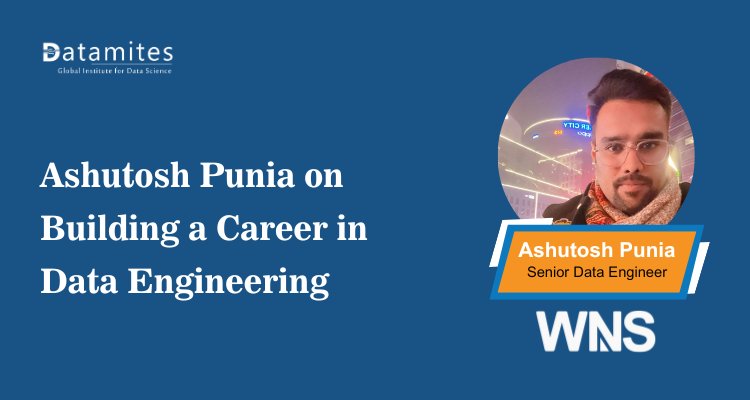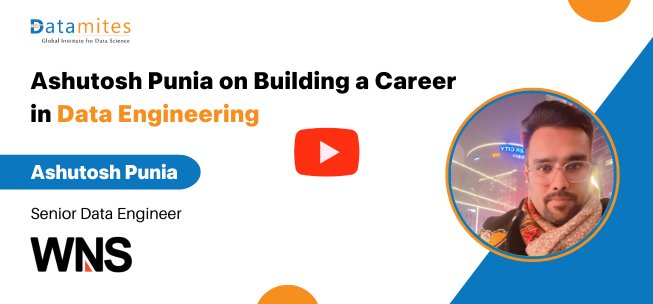Ashutosh Punia on Building a Career in Data Engineering
Ashutosh Punia shares valuable insights on building a successful career in Data Engineering. He covers the essential skills, tools, and strategies needed to thrive in this fast-growing field. Readers will gain practical advice to kickstart and advance their journey in data-driven roles.

Data engineering has emerged as one of the fastest-growing career paths in technology. With businesses generating massive volumes of data daily, there’s a surging demand for professionals who can efficiently collect, process, and manage this information. For those coming from non-technical backgrounds, the path to becoming a data engineer may seem daunting, but it’s increasingly achievable with the right guidance and training.
To provide a real-world perspective, we spoke with Ashutosh, a data engineering professional and alumnus of DataMites. He shared his career journey, the challenges he faced along the way, and practical advice for aspiring data engineers looking to break into this field. His story highlights the skills, perseverance, and learning strategies required to succeed in a rapidly evolving data-driven landscape. Watch DataMites success stories to see how others have transformed their careers and gained the expertise needed to grow in data engineering.
Ashutosh Punia’s Journey to Becoming a Data Engineer with DataMites Training
Learn how Ashutosh transitioned into a data engineering career, built crucial skills, and advanced professionally through hands-on training and guidance from DataMites.
1. Can you introduce yourself and share your career journey?
I started in 2018 with a non-IT job but had a major in Big Data. After moving to Bangalore, I was eager to find a data-related role. I came across DataMites and decided to enroll in their weekend classes. This decision transformed my career, giving me the foundation and exposure needed to grow into data science and eventually data engineering.
2. How did you transition from a non-technical role to data science?
After joining DataMites, I gained hands-on experience with real-time projects. This practical exposure, combined with mentorship from Ashutosh Sir, helped me understand statistics, machine learning algorithms, and Python. Eventually, I worked as a data scientist for a few years, building confidence and technical expertise.
3. What prompted your move from data science to data engineering?
The main factor was demand and salary. Data engineering roles are critical because they handle large-scale data pipelines, ETL processes, and cloud storage. I upskilled myself in Azure, PySpark, SQL, and data lakes, which positioned me as a multistack professional and opened multiple job opportunities.
4. What role did DataMites play in your career growth?
DataMites provided strong foundational knowledge, hands-on projects, and internship opportunities. The mentorship helped me understand the math behind algorithms, apply statistics correctly, and navigate complex real-time projects skills that proved invaluable during interviews.
5. What tools and skills are essential for a data engineer?
Key skills include:
- Cloud platforms (Azure recommended due to industry adoption)
- PySpark and Databricks
- SQL and Python
- ETL tools like Azure Data Factory
- Understanding data lakes and data warehousing concepts
6. How long does it take to become proficient in these tools?
With consistent practice:
- SQL & Python: 2–3 months
- Data lake concepts: 1 week
- PySpark/Databricks & Azure Data Factory: ~1 month each
7. How did your initial data science training help with interviews?
The training strengthened my understanding of statistics, linear regression, and Python. Real-time project experience allowed me to explain project cycles confidently. Knowing how to contextualize data science use cases for different industries gave me an edge in interviews.
8. What was your preparation strategy for interviews at EY and WNS?
I practiced daily on platforms like HackerRank, GeeksforGeeks, and LeetCode, solving 3–5 Python and SQL problems. I also revised data structures fundamentals regularly to ensure I could answer technical questions confidently.
9. How important is understanding data pipelines for a data engineer?
It’s crucial. A data engineer extracts data from multiple sources, transforms it into usable formats, and loads it into storage solutions. Being skilled in ETL processes ensures data is accurate, structured, and ready for analysis.
10. Which cloud platform do you recommend for beginners and why?
I recommend Azure because:
- Many companies in India are adopting Azure
- It integrates seamlessly with Microsoft tools like Teams and Outlook
- It offers strong growth opportunities and competitive salaries
11. How do you stay updated with new tools and technologies?
Continuous learning is key. I read articles, explore new frameworks, and study case studies across industries like pharmaceuticals, retail, and e-commerce to understand how data engineering adds value.
12. What challenges did you face moving back to Chandigarh during COVID?
Relocating meant adjusting to a new market and learning cloud technologies independently. I focused on Azure, SQL, PySpark, and cloud storage to position myself for high-demand data engineering roles.
13. How does the role of a data engineer differ from that of a data scientist?
Data scientists focus on predictive models and insights. Data engineers handle the data infrastructure collecting, storing, and maintaining data pipelines. In large projects, there may be 2–3 data scientists but 10–12 data engineers managing big data.
14. How important is Python proficiency for data engineering?
Python is essential for scripting, automation, and data manipulation. Alongside SQL, it forms the backbone of most data engineering workflows. Daily practice ensures problem-solving efficiency during interviews and on-the-job tasks.
15. How do you handle ETL pipelines in Azure?
Using Azure Data Factory, I design pipelines that extract raw data from sources like ERP systems, transform it into usable formats, and load it into data lakes. This involves collaboration with stakeholders to ensure data quality and usability.
16. What advice would you give to beginners aiming for a data engineering career?
Focus on fundamentals first: Python, SQL, and cloud basics. Build hands-on experience through small projects. Stay curious, practice daily, and leverage case studies to understand real-world applications.
Refer these articles:
- From Curiosity to Career: Shashank’s Path into Data Engineering
- Charting a Path in Data Engineering with Asutosh
- How Parag Thakur Built His Career in Data Science
Ashutosh’s Path to Data Engineering: Key Insights and Achievements
Ashutosh’s journey shows how commitment, hands-on projects, and structured training can turn a non-technical background into a successful data engineering career, highlighting persistence and continuous skill growth.
- Career Start and Motivation: The speaker initially worked in a non-IT role but moved to Bangalore seeking better opportunities in the data domain.
- Joining Practice is Key: Regular practice of coding problems on platforms like HackerRank, LeetCode, or GeeksforGeeks is critical to nail interviews.
- Impact of Mentorship: Guidance from Ashok Sir was crucial in understanding statistics, machine learning concepts, and real-time project exposure.
- Hands-on Experience: Internship opportunities and real-time project work helped build confidence to tackle interviews and practical problems.
- Transition from Data Science to Data Engineering:
- Shifted to data engineering due to higher demand, better pay, and exposure to cloud technologies.
- Upskilling in Cloud & Big Data: Learned Azure, Azure Data Factory, PySpark, DataBricks, Data Lake, SQL, and Python to become a “multistack” professional.
- Importance of Cloud Platforms: Emphasis on Azure due to growing adoption in Indian industries and compatibility with Microsoft enterprise tools.
- Core Skills for Data Engineers:
- Python and SQL
- Cloud fundamentals (Azure recommended)
- ETL tools (Azure Data Factory)
- Big Data frameworks (PySpark, DataBricks)
- Interview Preparation Strategy:
- Focus on fundamentals of data structures, algorithms, and SQL/Python.
- Understand real-time project cycles and use cases.
- Be able to discuss how data solutions add value to business domains.
- Data Engineering Demand: There’s a higher demand for data engineers than data scientists in large organizations due to the complexity of handling big data.
- Project Exposure Matters: Being able to explain end-to-end project cycles is essential for interviews, especially for freshers transitioning to technical roles.
- Continuous Learning: Even after formal training, expanding knowledge through articles, case studies, and industry examples is necessary to stay relevant.
- Work-Life Balance Consideration: Career decisions also factored in quality of life, as seen in choosing WNS Global.
- Strategic Career Growth: Combining data science knowledge with cloud and big data engineering skills significantly increases employability and salary prospects.
Refer these articles:
- How to Become a Data Scientist in Bangalore
- Data Science Course Fee in Bangalore
- How to Become a Data Scientist in Pune
- Data Science Course Fee in Pune
Ashutosh’s journey shows that even with a non-technical background, consistent learning, hands-on projects, and strategic upskilling can lead to a successful career in data engineering. For anyone aiming to break into this field, the key is mastering core tools, understanding the full data pipeline, and staying updated with industry trends.
If you’re starting out in data science or thinking about switching careers, Ashutosh Punia’s journey shows why building strong fundamentals, practicing consistently, and gaining practical experience are key. According to Grand View Research, the global data science platform market, valued at USD 96.25 billion in 2023, is expected to grow at a 26% CAGR from 2024 to 2030. The surge in data generated by digital activities across industries is fueling demand for skilled professionals, making data science one of the most sought-after IT courses today.
Ashutosh’s career growth was shaped by structured training at DataMites. Their beginner-friendly courses, designed for learners from non-technical backgrounds, helped him master Python, statistics, and machine learning, while gaining hands-on experience through internships as a Data Analyst and real-world data science projects. With globally recognized certifications like IABAC and NASSCOM FutureSkills, DataMites provides project experience, expert mentorship, and placement support. Choosing a data science training in Bangalore, Hyderabad, Kolkata, Pune, Mumbai, Chennai, or Delhi can set you on a path to a rewarding, future-ready career.
Whether you’re a fresher, a professional from a non-technical background like Ashutosh, or exploring a career transition, DataMites makes high-quality data science education accessible. With both online and offline centers including data science courses in Pune, Coimbatore, Mumbai, Bangalore, Chennai, Ahmedabad, and Hyderabad and flexible online options, Ashutosh’s story proves that with structured guidance, hands-on learning, and consistent effort, breaking into data science is entirely achievable and a smart step toward a future-ready career.

